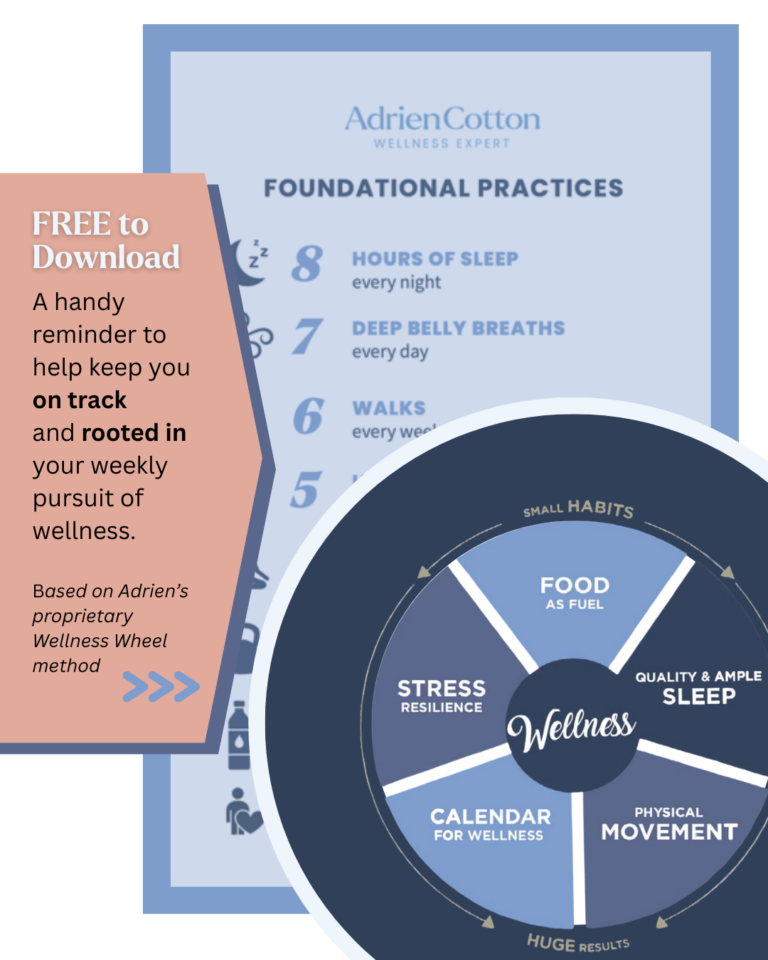Last week I identified the broader concept of cheating on your healthy diet. I first asked you to explore and get curious about your wellness plan. Do you have one and does it help you gain control of your life instead of life being in control of you? Now, no more waiting. Here are my five most trusted — and researched — practices that will help you stay away from your cheat.
1. Plan ahead
Identify any obstacles to your current healthy eating plan and create tangible solutions you know you’ll practice.
Here are my trusty stress resilience practices to help you:
Spend 15-30 minutes every Sunday to plan your week. Plan your work projects, categorizing them between low/medium/high priority. Add in your family or self-care needs in the same way: low/medium/high. (After a while, you’ll find the number of “high” priority projects you must do are few.) Then add weekly projects (grocery, gas, etc) you need to complete as well as the social outing(s) to which you are committed.
Write down what time you will get up each day, what you’ll eat for your meals and your snacks, when you’ll workout.
Plan around your schedule. If you have a meeting any time between 3-5pm in the afternoon, plan a healthy snack before and prepare it so you can eat it easily. That’s the common “witching hour” of “hangriness” (hungry combined with angry). This will prevent you from wanting to eat your fist at 7pm when you are possibly out for a social or business outing.
2. Get social support
“We’re the average of the five people with whom we spend the most time.”
Surrounding yourself with others who are also aiming for optimal health will not only give you the support for those situations when you are tempted to cheat, they’ll also be there with you to celebrate the small victories such as favorable blood test results, going sleeveless with confidence, or completing a tough exercise for the first time.
3. Brush your teeth throughout the day
Create an environment where food isn’t tasty – like after you brush your teeth!
Who wants to eat ice cream after the minty toothpaste taste is still in your mouth?
4. Prepare your food in advance
Start small. Spend a little time to prepare even just one day of meals and snacks in advance. This will help stave off temptation throughout the day.
This will take away the temptation to go out for lunch, to have an unhealthy snack, or to join a group for an outing when you already have your lunch or dinner prepared. After all, you spent your precious time preparing — why waste it?! Prepared snacks are key to any successful nutrition program. By first planning ahead (see #1), you’ve already identified times in your day or week when you want to get on top of an otherwise disastrous snacking binge. This also applies to the post-dinner “I’m hungry” one hour later. You aren’t hungry. Your body is stressed and needs to go to bed. So…go to bed. If you are “hungry” fewer than four hours after a meal, it is a craving, not hunger. Your body hasn’t had the chance to digest the last meal you ate!
5. Be aware of the clock
Know the time of the day when most people cheat so you can be in control of you instead of the temptation controlling of you.
Time 1: When you are tired. Your cortisol is already spent. Your body is craving sugar – or reward.
Time 2: It’s late at night. Sorry, folks, just don’t go there. Your sleep is so important to your health, waistline, and to not craving bad foods. It isn’t worth it to be up late. You gain nothing for your awesome life. It’s filler. We’re more irritable. We are less productive. We lose years off our life…all just from lack of sleep.
Time 3: Alcohol is involved. The less you drink, the better. Limit your alcohol to weekends only and that doesn’t mean Friday, Saturday, andSunday. It raises your sugar levels, impedes restful sleep and doesn’t help you make the best of your workout the next day.
Time 4: Hanging out with friends. Love your social support…but make sure your social outings aren’t always filled with booze. Meet a friend for a walk, a movie. Someplace that doesn’t involve food.



